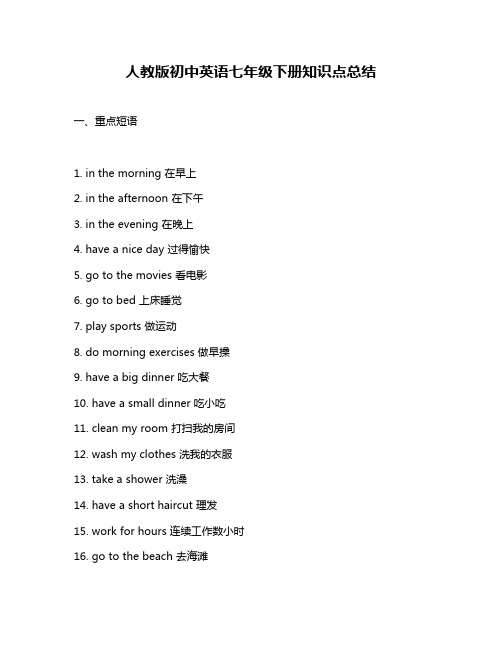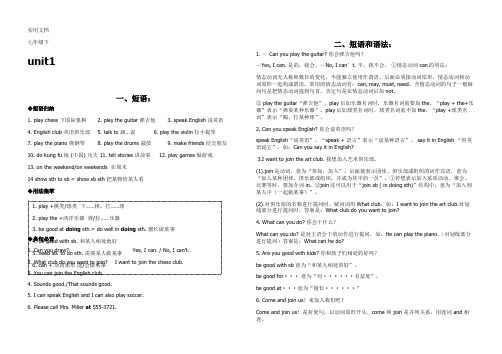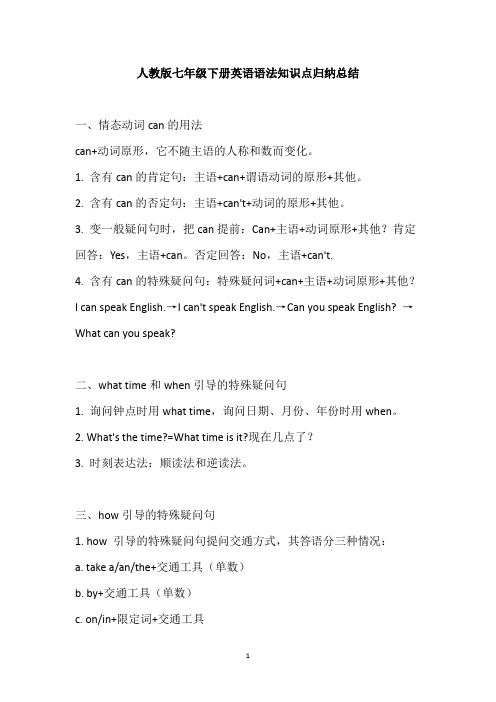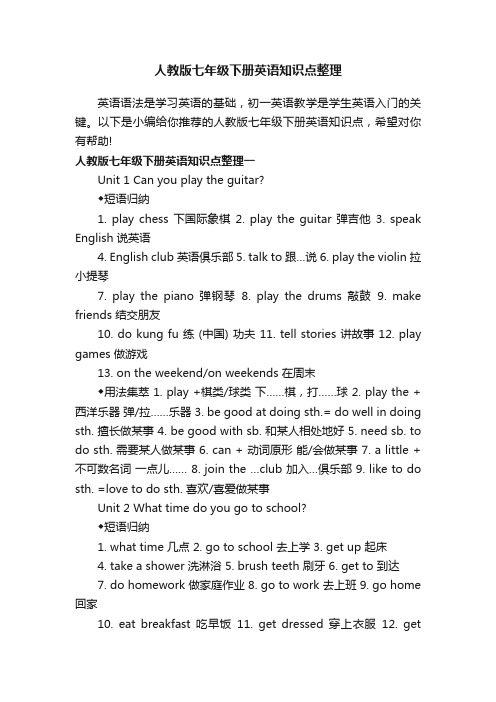人教版七年级英语下册知识点全总结
人教版初中英语七年级下册知识点总结

人教版初中英语七年级下册知识点总结一、重点短语1. in the morning 在早上2. in the afternoon 在下午3. in the evening 在晚上4. have a nice day 过得愉快5. go to the movies 看电影6. go to bed 上床睡觉7. play sports 做运动8. do morning exercises 做早操9. have a big dinner 吃大餐10. have a small dinner 吃小吃11. clean my room 打扫我的房间12. wash my clothes 洗我的衣服13. take a shower 洗澡14. have a short haircut 理发15. work for hours 连续工作数小时16. go to the beach 去海滩17. on the weekend 在周末18. listen to music 听音乐19. have a party 举办聚会20. watch TV 看电视21. play computer games 玩电脑游戏22. in the pool 在游泳池里23. go to the zoo 去动物园24. in the mountains 在山里25. have fun 玩得开心26. the great wall 长城27. many places of interest 名胜古迹28. be ready for 为……准备好29. stay healthy 保持健康30. how much 多少31. would you like 一些……吗?32. some noodles 一些面条33. order a pizza 定一个披萨饼34. make a phone order 电话订购35. would you like to do sth 你愿意做某事吗?36. want to do sth 想做某事37. would you like +名词你愿意要……吗?38. would you like +动词不定式你愿意……吗?39. choose some food 选择一些食物40. order the food 订购食物41. be careful 当心;小心42. not much 不多;少量的43. be ready to do sth 准备好做某事。
人教版2024七年级下册英语unit1重点单词、词性转换、短语、句型背默 讲义+素材

人教版七下unit1背诵版一、重点单词:penguin / 'pengwin/n.企鹅care /keə(r)/ n.照顾;护理v.关心;在乎sandwich / 'sanwɪtf;sanwɪdʒ.n.三明治snake/sneɪk/ n.蛇scary / 'skeəri/ adj. 吓人的;恐怖的guess /ges/ v.猜测;估计shark /ʃa:k/ n.鲨鱼whale /weɪl/ n.鲸huge /hju:dʒ/ adj. 巨大的;极多的dangerous / 'deindʒərəs/ adj.危险的;有危害的save/seɪv/ v.救;储蓄;保存luck /lʌk/ n.幸运;运气trunk /trʌŋk/n.象鼻pick /pɪk/v.捡;摘carry /'kæri/ v.拿;提playful /'pleɪfl/adj.爱嬉戏的;爱玩的culture /'kʌltʃə(r)/n.文化;文明however /hau'evə(r)/ adv.然而;不过danger /'deindʒə(r)/ n.危险forest/'fɒrɪst/n.森林kill /kɪl/ v.杀死;弄死ivory /'aɪvəri/ n.象牙friendly / 'frendlɪ/ adj.友好的quite /kwaɪt/ adv.相当;完全fur /fɜː(r)/n.(动物浓厚的)软毛blind /blaɪnd/ adj.瞎的:小明的hearing /'hɪərig/ n.听力;听觉二、重点词性转换:1.care→careful(形容词)→careless(反义词)→carefully(副词)2.danger→dangerous(形容词)3.luck→lucky(形容词)→unlucky(反义词)→luckily(副词)→unluckily(反义副词)4.playful→play(动词)→player(名词)5.culture→cultural(形容词)6.friendly→friend(名词)7.hearing→hear(动词)三、重点短语:take care of照顾;处理pick up拿起;举起one another互相look after照顾in danger处于危险之中cut down砍伐;减too many 太多made of由……制成的quite a相当;非常not ... at all一点也不;完全不四、重点句子1.The penguin is my favourite animal. What's your favourite animal?2.They can't fly like other birds, but they can swim fast.3.I love elephants because they are strong and clever. They are also a symbol of good luck here.4.They can pick up and carry heavy things with their trunks.5.Elephants are very kind too. They look after other elephants when they don't feel well.6.Elephants are an important part of Thai life and culture.人教版七下unit1默写版一、重点单词:__________/ 'pengwin/n.企鹅__________/keə(r)/ n.照顾;护理v.关心;在乎__________/ 'sanwɪtf;sanwɪdʒ.n.三明治__________/sneɪk/ n.蛇__________/ 'skeəri/ adj. 吓人的;恐怖的__________/ges/ v.猜测;估计__________/ʃa:k/ n.鲨鱼__________/weɪl/ n.鲸__________/hju:dʒ/ adj. 巨大的;极多的__________/ 'deindʒərəs/ adj.危险的;有危害的__________/seɪv/ v.救;储蓄;保存__________/lʌk/ n.幸运;运气__________/trʌŋk/n.象鼻__________/pɪk/v.捡;摘__________/'kæri/ v.拿;提__________/'pleɪfl/adj.爱嬉戏的;爱玩的__________/'kʌltʃə(r)/n.文化;文明__________/hau'evə(r)/ adv.然而;不过__________/'deindʒə(r)/ n.危险__________/'fɒrɪst/n.森林__________/kɪl/ v.杀死;弄死__________/'aɪvəri/ n.象牙__________/ 'frendlɪ/ adj.友好的__________/kwaɪt/ adv.相当;完全__________/fɜː(r)/n.(动物浓厚的)软毛__________/blaɪnd/ adj.瞎的:小明的__________/'hɪərig/ n.听力;听觉二、重点词性转换:1.care→__________(形容词)→__________(反义词)→__________副词)2.danger→__________(形容词)3.luck→__________(形容词)→__________(反义词)→___________(副词)→____________(反义副词)4.playful→__________(动词)→___________(名词)5.culture→___________(形容词)6.friendly→___________(名词)7.hearing→___________(动词)三、重点短语:__________照顾;处理__________拿起;举起__________互相__________照顾__________处于危险之中__________砍伐;减__________太多__________由……制成的__________相当;非常__________一点也不;完全不四、重点句子1.企鹅是我最喜欢的动物,你最喜欢的动物是什么?_______________________________________________________________________ 2.他们不能像其他鸟一样飞,但是他们可以游地很快。
人教版七年级英语下册各知识点归纳总结

七年级下unit1一、短语:◆短语归纳1. play chess 下国际象棋2. play the guitar 弹吉他3. speak English 说英语4. English club 英语俱乐部5. talk to 跟…说6. play the violin 拉小提琴7. play the piano 弹钢琴8. play the drums 敲鼓9. make friends 结交朋友10. do kung fu 练 (中国) 功夫 11. tell stories 讲故事 12. play games 做游戏13. on the weekend/on weekends 在周末14 show sth to sb = show sb sth 把某物给某人看◆用法集萃◆典句必背1. Can you draw? Yes, I can. / No, I can’t.2. What club do you want to join? I want to join the chess club.3. You can join the English club.4. Sounds good./That sounds good.5. I can speak English and I can also play soccer.6. Please call Mrs. Miller at 555-3721.二、短语和语法:1. — Can you play the guitar? 你会弹吉他吗?—Yes, I can. 是的,我会。
—No, I can’t. 不,我不会。
①情态动词can的用法:情态动词无人称和数目的变化,不能独立使用作谓语,后面必须接动词原形,情态动词和动词原形一起构成谓语。
常用的情态动词有:can, may, must, need。
含情态动词的句子一般疑问句是把情态动词提到句首,否定句是在情态动词后加not。
人教版七年级下册英语语法知识点归纳总结

人教版七年级下册英语语法知识点归纳总结一、情态动词can的用法can+动词原形,它不随主语的人称和数而变化。
1. 含有can的肯定句:主语+can+谓语动词的原形+其他。
2. 含有can的否定句:主语+can't+动词的原形+其他。
3. 变一般疑问句时,把can提前:Can+主语+动词原形+其他?肯定回答:Yes,主语+can。
否定回答:No,主语+can't.4. 含有can的特殊疑问句:特殊疑问词+can+主语+动词原形+其他?I can speak English.→I can't speak English.→Can you speak English? →What can you speak?二、what time和when引导的特殊疑问句1. 询问钟点时用what time,询问日期、月份、年份时用when。
2. What's the time?=What time is it?现在几点了?3. 时刻表达法:顺读法和逆读法。
三、how引导的特殊疑问句1. how 引导的特殊疑问句提问交通方式,其答语分三种情况:a. take a/an/the+交通工具(单数)b. by+交通工具(单数)c. on/in+限定词+交通工具---How do you go to school every day?---I take a bus to go to school every day./I go to school by bus every day./I go to school on the bus every day.2. how far 用来提问距离,多远,其答语分为两种:(1)用长度单位表示:It is five kilometers.(2)用时间表示:It’s twenty minutes’walk.3. how long 用来提问时间,意为多久回答常用“for+段时”。
人教版七年级下册英语知识点整理

人教版七年级下册英语知识点整理英语语法是学习英语的基础,初一英语教学是学生英语入门的关键。
以下是小编给你推荐的人教版七年级下册英语知识点,希望对你有帮助!人教版七年级下册英语知识点整理一Unit 1 Can you play the guitar?◆短语归纳1. play chess 下国际象棋2. play the guitar 弹吉他3. speak English 说英语4. English club 英语俱乐部5. talk to 跟…说6. play the violin 拉小提琴7. play the piano 弹钢琴8. play the drums 敲鼓9. make friends 结交朋友10. do kung fu 练 (中国) 功夫 11. tell stories 讲故事 12. play games 做游戏13. on the weekend/on weekends 在周末◆用法集萃 1. play +棋类/球类下……棋,打……球 2. play the +西洋乐器弹/拉……乐器 3. be good at doing sth.= do well in doing sth. 擅长做某事 4. be good with sb. 和某人相处地好 5. need sb. to do sth. 需要某人做某事 6. can + 动词原形能/会做某事 7. a little + 不可数名词一点儿…… 8. join the …club 加入…俱乐部 9. like to do sth. =love to do sth. 喜欢/喜爱做某事Unit 2 What time do you go to school?◆短语归纳1. what time 几点2. go to school 去上学3. get up 起床4. take a shower 洗淋浴5. brush teeth 刷牙6. get to 到达7. do homework 做家庭作业 8. go to work 去上班 9. go home 回家10. eat breakfast 吃早饭11. get dressed 穿上衣服12. gethome 到家13. either…or… 要么…要么… 14. go to bed 上床睡觉15. in the morning/ afternoon/ evening 在上午/下午/晚上16. take a walk 散步 17. lots of=a lot of 许多,大量 18. radio station 广播电台19. at night 在晚上 20. be late for=arrive late for 迟到◆用法集萃1. at + 具体时间点在几点(几分)2. eat breakfast/ lunch/dinner 吃早饭/午饭/晚饭3. thirty\half past +基数词……点半4. fifteen\a quarter to +基数词差一刻到……点5. take a/an +名词从事……活动6. from …to … 从……到……7. need to do sth 需要做某事人教版七年级下册英语知识点整理二Unit 3 How do you get to school?◆短语归纳1. get to school 到达学校2. take the subway 乘地铁3. ride a bike 骑自行车4. how far 多远5. from home to school 从家到学校6. every day 每天7. take the bus 乘公共汽车 8. by bike 骑自行车 9. bus stop 公共汽车站10. think of 认为11. between … and … 在…和…之间12. one 11-year-old boy 一个11岁的男孩13. play with … 和…玩14. come true 实现 15. have to 不得不◆用法集萃1. take… to …= go to … by… 乘…去… 2. How do / does (sb)get to …? …是怎样到…的? 3. How far is it from … to …? 从…到…有多远? 4. It takes sb. some time to do sth. 做某事花费某人多长时间。
人教版初一英语下册知识点总结

人教版初一英语下册知识点总结第一篇:人教版初一英语下册知识点总结Unit 1 Where’s your pen pal from?一.短语:.be from = come from来自于----2. live in 居住在---3. on weekends 在周末 4 .write to sb = write a letter to sb 给某人写信;写信给某人.in the world 在世界上6.in China在中国7.pen pal笔友8.14 years old14岁9.favorite subject 最喜欢的科目10.the United States 美国the United Kingdom 英国New York 纽11.speak English 讲英语 like and dislike 爱憎9.go to the movies 去看电影play sports 做运动二.重点句式:Where’s your pen p al from? = Where does your pen pal from/Where does he live?3 What language(s)does he speak?4 I want a pen pal in China.5 I can speak English and a little French.6 Please write and tell me about yourself.7 Can you write to me soon?8 I like going to the movies with my friends and playing sports.三.本单元的国家,人民、语言对应。
Canada----Canadian----English / French2 France------French------FrenchJapan------Japanese----Japanese4 Australia----Australian-----Englishthe United States------American----English6 the United Kingdom---British-----EnghishUnit 2 Where’s the post office?一. Asking ways:(问路)1.Where is(the nearest)……?(最近的)……在哪里?2.3.4.5.Can you tell me the way to ……?你能告诉我去……的路吗?How can I get to ……?我怎样到达……呢?Is there …… near here / in the neighborhood?附近有……吗?Which is the way to ……?哪条是去……的路?二.Showing the ways:(指路)1.Go straight down / along this street.沿着这条街一直走。
人教版人教版七年级下册英语知识点复习(完整版)
人教版人教版七年级下册英语知识点复习(完整版)Unit 1 Can you play the guitar?1.Can do is equivalent to be able to do when used with a modal verb and a verb in its base form.e the definite article "the" when XXX.e "join" when XXX。
n。
or group.4.Say is used to express the content of a message。
while speak is used to express the language in which the message is XXX。
and tell is used to XXX.5."Want" can be replaced with "would like" when making a request for someone to do something.6."Too" is used in affirmative sentences with a comma before it。
while "either" is used in negative sentences with a comma before it。
"Also" is used after the verb "be," and "as well" is used in spoken language without a comma before it.7."Be good at" is used to XXX or activity。
人教版七年级英语下册单元知识点总结(全册)
人教版七年级英语下册单元知识点总结(全册)Unit 1 Can you play the guitar?一短语归纳1.speak English/Chinese 说英语/汉语2. what club /sports什么俱乐部/运动3.play the guitar/ piano/drums/ violin 弹吉它/弹钢琴/敲鼓/拉小提琴4. play chess/ basketball/ volleyball/ soccer 下国际象棋/ 打篮球/排球/足球5.tell stories讲故6. the art/chess/swimming/sports/ story telling/English club艺术/国际象棋/游泳/体育/讲故事/英语俱乐部7.school show 学校演出8.sound good听起来不错9.teach music 教音乐10.do kung fu练(中国) 功夫11.make friends(with sb.)(结交朋友)12.on the weekend/on weekends在周末e and show us来给我们表演15.write stories写故事16.after school放学后17.English-speaking students说英语的学生18.play games 做游戏19.the Students’ Sports Center学生运动中心20.at the old people’s home在老人之家21.be in our school music festival 参加学校音乐节22.jion the music club加入音乐俱乐部二用法集萃1. play +棋类/球类下……棋,打……球2. play the +乐器弹/拉……乐器3. be good at doing sth.擅长做某事be good for.. 对… 有好处be good /kind to … 对… 友好4. be good with sb. 和某人相处地好; 善于应付(处理)…5. need(sb./sth.)to do… 需要(某人/某物)做….6. can + 动词原形能/会做某事7. a little + 不可数名词: 一点儿……9. like to do sth.或like doing sth. 喜欢做某事10.want to do…想做……11.What about…?…怎么样?(后面接Ving/代词/名词)12. talk用法: talk to/with sb. 跟某人说话talk about sth. 谈论某事tell 用法:tell sb sth. 告诉某人某事tell sb to do sth 告诉某人去做某事tell stories 讲故事say用法:say直接加说话的内容/itspeak用法:speak +语言13.help sb. with sth在某方面帮助某人= help sb.(to)do sth14.be free /busy有空/很忙15. call sb. at+号码拨打某人的……号码16. be in=join …成为…中的一员(P6)17.want …for the school show为学校表演招聘……三典句必背1. Can you draw? 你会画画吗?Yes, I can. / No, I can’t.是,我会。
人教版英语七年级下册考点知识点归纳
人教版英语七年级下册考点知识点归纳Unit 7一、短语归纳1. not bad 不错2. at the park 在公园3. take a message for…为……捎个口信4. have a good time/have a great time/have fun/enjoy oneself 过得愉快5. call sb. back 给某人回电话6. no problem 没问题7. right now 现在8. talk on the phone 通过电话交谈9. some of ......当中的一些10. by the pool 在游泳池边11. drink orange juice 喝橙汁12. study hard 努力学习13. on a vacation 在度假14. in the mountains 在山里15. call sb. 给某人打电话16. write to sb. 给某人写信二、用法归纳1.询问天气的表达方式:How’s the weather?It’sa raining/sunny day.It’s raining.What’s the weather like?It’s windy.2.How’s it/ everything going?3.take a message for sb 给某人捎口信leave amessage to sb 给某人留言4.right now,right away,atonce,in a minute,in a moment,in no time 立刻,马上right now现在just now刚刚(用于一般过去式)5.over and over again6.the answer to thequestion,a key to the door,a ticket to the ball game7.by the pool8.go on a vacation去度假be on a vacation在度假9.write (a letter)to sb 给某人写信10.反意疑问句(陈述句+附加疑问句)反意疑问句中,陈述句用的肯定,后面的附加疑问句就要用否定;相反,陈述句用的否定,附加疑问句就要用肯定.11.adj 以-ing结尾“令人…的”exciting,interesting,relaxing 以-ed结尾“人感到…的”excited,interested,relaxed12. tell sb. (not) to do sth. 告诉某人(不要)做某事13. have a great time/have fun + (in) doing sth. 愉快地做某事14. just right for doing sth. 做某事正合适三、典句必背归纳1. How’s the weather? 天气怎么样?2. It’s cloudy. / It’s sunny. / It’s raining.天气多云。
人教版七年级下册英语知识点复习(完整版)
人教版七年级下册英语知识点复习(完整版) Unit 1 Can you play the guitar?1,情态动词+V原can do= be able to do2,Play+ the+ 乐器+球类,棋类3,join 参加社团、组织、团体4,4个说的区别:say+内容Speak+语言Talk 谈论talk about sth talk with sb talk to sbTell 告诉,讲述tell sb (not)to do sthTell stories/ jokes5,want= would like +(sb)to do sth6,4个也的区别:too 肯定句末(前面加逗号)Either否定句末(前面加逗号)Also 行前be 后As well 口语中(前面不加逗号)7,be good at+ V-ing=do well in 擅长于be good for 对…有益(be bad for对…有害)be good to 对…友好(good 可用friendly,nice,kind替换)be good with和…相处好=get on/ along well with8,特殊疑问句的构成:疑问词+一般疑问句9,How/ what about+V-ing …怎么样?(表建议)10,感官动词(look, sound, taste, smell, feel)+adj/ like11,选择疑问句:回答不能直接用Yes或者No,要从中选择一个回答12,students wanted for school show(wanted表示招募,含有被动意义)13,show sth to sb=show sb sth give sth to sb=give sb sth14,help sb (to)do sthHelp sb with sthWith sb’s help= with the help of sbHelp oneself to 随便享用15,be busy doing sth/ be busy with sth16,need to do sth17,be free= have time18,have friends= make friends19,call sb at +电话号码20,on the weekend= on weekends21,English-speaking students 说英语的学生(带有连词符,有形容词性质)22,do kung fu表演功夫Unit 2 What time do you go to school?1,问时间用what time或者whenAt+钟点at 7 o’clock at noon/ at night(during/ in the day)On+ 具体某天、星期、特指的一天on April 1st on Sunday on a cold winter morningIn +年、月、上午、下午、晚上2,时间读法:顺读法逆读法:分钟≤30用past five past eight(8:05)half past eight(8:30)分钟>30用to a quarter to ten(9:45)整点用…o’clock 7 o’clock(7:00)3,3个穿的区别:wear 表状态,接服装、手套、眼镜、香水等Put on 表动作,接服装Dress 表动作,接sb/ oneself get dressed穿衣3,感叹句:How+adj+主谓!How+adj+a/an +n单+主谓!What+ a/an +adj+ n单+主谓!What+ adj+ n复/ 不可数+主谓!4,from…to…5,be/ arrive late for6,频度副词(行前be 后)Always usually often sometimes seldom hardly never7,一段时间前面要用介词for for half an hour for five minutes8,eat/ have…for breakfast/ lunch/ dinner/ supper9,either…or10,a lot of=lots of11,it is +adj+for sb +to do sth (adj修饰to do sth)It is important for me to learn English.it is +adj+of sb +to do sth (adj修饰sb)It is kind/ friendly/ nice of you to help me.Unit 3 How do you get to school?1,疑问词How 如何(方式)how long 多长(时间)答语常用“(For/ about +)时间段”how far多远(距离)答语常用“(It’s +)数词 +miles/ meters/ kilometers”how often多久一次(频率)答语常用“Always/ often/ every day/…”或“次数+时间”等表频率的状语How soon多快,多久以后,常用在将来时中。
- 1、下载文档前请自行甄别文档内容的完整性,平台不提供额外的编辑、内容补充、找答案等附加服务。
- 2、"仅部分预览"的文档,不可在线预览部分如存在完整性等问题,可反馈申请退款(可完整预览的文档不适用该条件!)。
- 3、如文档侵犯您的权益,请联系客服反馈,我们会尽快为您处理(人工客服工作时间:9:00-18:30)。
人教版七年级英语下册知识点全总结I am writing to introduce myself and share my strengths with you。
Firstly。
I am good at playing the guitar。
Whenever I have free time。
I always pick up my guitar and play some tunes。
I also enjoy playing the piano and the lin.In n to my musical abilities。
I am fluent in English and enjoy speaking with others。
I have joined the English club at my school and love to talk to my classmates in English。
I also enjoy telling stories and making friends.On weekends。
I like to play games and do kung fu。
I find these activities both challenging and fun。
I am always looking for new opportunities to learn and grow.Thank you for taking the time to read my letter。
I hope to have the opportunity to share my strengths with you in person.Sincerely。
Your Name]Dear Sir/Madam。
I am writing to express my interest in joining your n to help children with sports。
music。
and English。
My name is Mike and I am a 15-year-old student at No。
1 Middle School。
I am skilledat playing the guitar。
singing。
swimming。
and speaking English。
I believe I can work well with children and I am also good attelling stories.I hope to receive your response soon.Sincerely。
MikeUnit 2: What is your daily routine?Phrases:1.What time: At what time2.Go to school: Attend school3.Get up: Wake up4.Take a shower: Shower5.Brush teeth: Brush one's teeth6.Get to: Arrive at7.Do homework: Complete homework8.Go to work: Commute to work9.Go home: Return home10.Eat breakfast: Have breakfast11.Get dressed: Dress up12.Get home: Arrive at home13.Either。
or: One of two ns14.Go to bed: Sleep15.In the morning/afternoon/evening: During the morning/afternoon/evening16.Take a walk: Go for a walk17.Lots of: Many18.n: Broadcasting n19.At night: During the night20.Be late for: Arrive late forUsage:1.At + specific time: At what time (hour/minute)2.Eat breakfast/lunch/dinner: Have breakfast/lunch/dinner3.Thirty/half past + cardinal number: Half past (hour)4.Fifteen/a quarter to + cardinal number: A quarter to (hour)5.Take a/an + noun: Engage in an activity6.From。
to。
: From。
to。
7.Need to do something: Have to do somethingSample sentence:Dear Sir/Madam。
I am writing to inquire about the daily routine of your n。
What time do you attend school and arrive at work。
Do you wake up early and shower before having breakfast。
Do you brush your teeth before or after breakfast。
Do you complete your homeworkin the morning or at night。
Do you go for a walk after dinner。
I am us about your daily habits and routines.Thank you for your time and n.Sincerely。
Your Name]1.What time do you usually wake up in the morning?I typically wake up at 6:30 AM.2.That's an unusual breakfast time.3.When do students usually have dinner?Students usually have dinner at 6:45 PM in the evening.4.In the evening。
I either watch TV or play computer games.5.At noon。
she eats a lot of fruits and vegetables for lunch.6.She knows it's unhealthy。
but it tastes good.7.These are your clothes.Topic Writing: Daily RoutineMy Daily RoutineI am a student and I usually wake up at 7 AM。
After having breakfast at 7:30 AM。
I leave for school at 8 AM。
Classes start at 8:30 AM。
I have lunch at 12 PM and return home at 5 PM。
In the evening。
I usually have dinner at 7 PM and then practice playing the piano。
I do my homework at 8 PM and go to bed at 10 PM.Phrase Recap:1.arrive at school2.take the subway3.ride a bike4.how far5.from home to school6.every dayTaking the bus or riding a bike are also popular ns。
but I prefer the exercise and fresh air that walking provides。
When I walk to school。
I am able to enjoy the scenery and think about my day ahead。
It only takes me about 15 minutes to get to school。
so it is not too far。
I used to take the bus。
but I found that it was often crowded and I had to wait at the bus。
for a long time。
Riding a bike was also an n。
but I did not feel safe on the busy roads。
In my n。
walking is the best way for me to go to school。
It is healthy。
convenient。
and enjoyable。
I do not have to worry about traffic or being late for the bus。
Overall。
I believe that everyone should choose the n method that works best for them。
Whether it is taking the bus。
riding a bike。
or walking。
as long as we arrive at school safely and on time。
that is all that matters.I live close to my school。
so it only takes me a few minutes to walk there。
Although there is a busy crossing on my way。
I still prefer to walk as it is safer and also good for my health。
Walking is a form of exercise that helps me study better。
